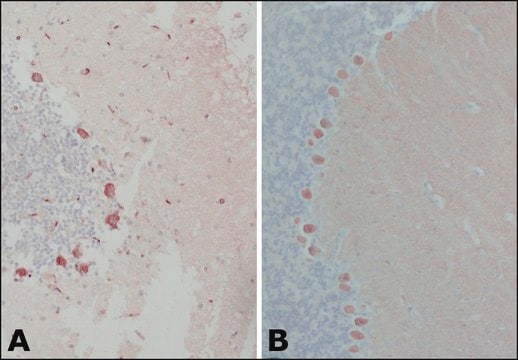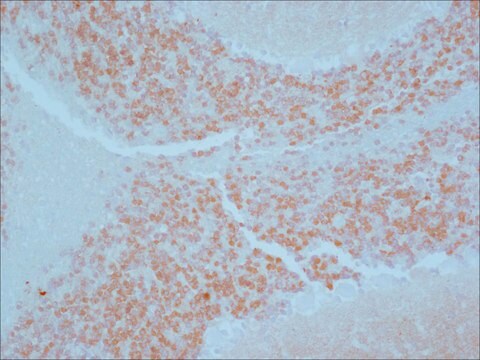C7354
Anti-Calbindin-D-28K (KD-15) antibody produced in rabbit

affinity isolated antibody, buffered aqueous solution
Synonym(s):
Anti-CALB, Anti-D-28K
About This Item
Recommended Products
biological source
rabbit
conjugate
unconjugated
antibody form
affinity isolated antibody
antibody product type
primary antibodies
clone
polyclonal
form
buffered aqueous solution
mol wt
antigen 28 kDa
species reactivity
rat, chicken, human
enhanced validation
independent
Learn more about Antibody Enhanced Validation
technique(s)
immunohistochemistry (formalin-fixed, paraffin-embedded sections): 1:500 using sections of rat, human or chicken cerebellum sections
microarray: suitable
western blot: 1:1,000 using recombinant rat calbindin-D-28K
UniProt accession no.
shipped in
dry ice
storage temp.
−20°C
target post-translational modification
unmodified
Gene Information
human ... CALB1(793)
mouse ... Calb1(12307)
rat ... Calb1(83839)
General description
Immunogen
Application
- immunocytochemistry
- western blotting
- microarray
- immunohistochemistry
Biochem/physiol Actions
Physical form
Analysis Note
Disclaimer
Not finding the right product?
Try our Product Selector Tool.
recommended
Certificates of Analysis (COA)
Search for Certificates of Analysis (COA) by entering the products Lot/Batch Number. Lot and Batch Numbers can be found on a product’s label following the words ‘Lot’ or ‘Batch’.
Already Own This Product?
Find documentation for the products that you have recently purchased in the Document Library.
Our team of scientists has experience in all areas of research including Life Science, Material Science, Chemical Synthesis, Chromatography, Analytical and many others.
Contact Technical Service







